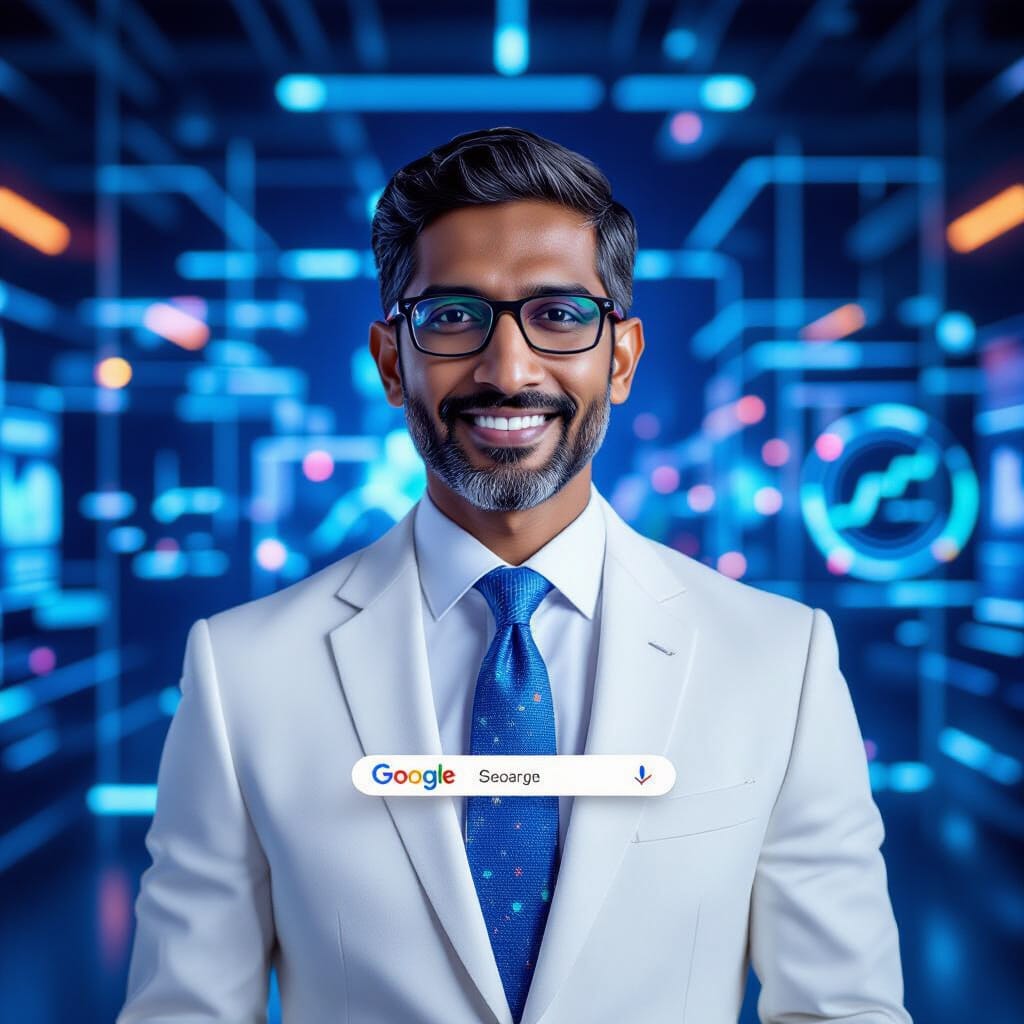The morning begins not with an alarm clock, but with a gentle notification from Google’s proprietary Executive Optimization System, which has determined that Sundar Pichai’s optimal wake time today is 5:23 AM—precisely calculated based on global search trends, Gmail traffic patterns, and the current emotional state of Android users worldwide. The system, internally codenamed “Project Pavlov,” has been monitoring Pichai’s sleep cycles for three years, cross-referencing them with Alphabet’s stock performance to identify the exact correlation between his REM stages and quarterly earnings.
Pichai’s first conscious act is reaching for his Pixel 9 Pro (still in beta, naturally), which immediately presents him with what Google’s AI calls his “Daily Relevance Score”—a number between 1 and 100 that represents how aligned his existence is with Google’s mission to organize the world’s information. Today’s score: 73.2, down from yesterday’s 74.1, apparently because he spent twelve minutes last night reading a physical book instead of consuming digitized content that could be properly indexed and analyzed.
The phone’s screen displays his personalized morning briefing, generated by an AI that has consumed every email he’s ever sent, every search query he’s ever made, and every pause he’s ever taken while speaking at developer conferences. The briefing includes global search trends (people are inexplicably searching for “how to make friends with a toaster”), YouTube engagement metrics (cat videos are down 0.3%, concerning), and what the AI euphemistically calls “competitive intelligence updates” (Apple announced something, Amazon is trying to be relevant, and Microsoft continues to exist despite everyone’s best efforts).
The Breakfast Algorithm
Pichai’s breakfast routine exemplifies what Google’s internal documents refer to as “nutritional data optimization.” His smart kitchen, powered by Google’s unreleased Nest Chef AI, has analyzed three years of his digestive patterns, cross-referenced them with his calendar appointments, and determined that today he requires exactly 347 calories distributed across specific macronutrient ratios to achieve optimal cognitive performance for his 2 PM meeting with the European Union’s antitrust commission.
The AI has prepared what it calls “Regulatory Compliance Oatmeal”—a breakfast scientifically formulated to enhance his ability to explain why Google’s dominance in search is actually good for consumers. The oatmeal contains precisely measured amounts of omega-3 fatty acids for brain function, B-vitamins for stress management, and what the AI describes as “trace amounts of humility supplements” to help him appear appropriately contrite during congressional hearings.
While eating, Pichai reviews Google’s overnight performance metrics on a custom dashboard that looks like mission control but for human attention spans. The dashboard shows real-time data on global search queries, YouTube watch time, Gmail opens, and something called “Android Happiness Index”—a metric that measures how frustrated users are with their phones on any given day. Today’s Android Happiness Index is 6.7 out of 10, which is considered excellent given that the latest update accidentally made everyone’s battery drain 23% faster.
The Commute to Omniscience
Pichai’s journey to Google’s Mountain View campus occurs in a self-driving car that’s essentially a mobile data collection unit disguised as transportation. The vehicle, part of Google’s “Executive Mobility Beta Program,” doesn’t just drive him to work—it conducts what the company calls “ambient user research” by recording his reactions to various stimuli during the commute.
Today’s route has been optimized not for traffic efficiency, but for “serendipitous innovation opportunities.” The AI has calculated that driving past exactly three Starbucks locations, two Tesla charging stations, and one struggling bookstore will provide the optimal mix of consumer behavior observations to inspire his next strategic decision. The car’s interior displays show real-time sentiment analysis of social media posts about Google products, scrolling past like a digital ticker tape of human frustration and occasional delight.
During the 27-minute drive, Pichai participates in what Google calls “Distributed Decision Making”—a system where he makes micro-decisions about product features based on data presented in rapid-fire succession. Should Gmail’s new AI feature be 3% more helpful or 5% more creepy? Should YouTube’s algorithm promote educational content or continue its current strategy of assuming everyone wants to watch increasingly specific conspiracy theories about household appliances? Each decision is recorded, analyzed, and fed back into Google’s master algorithm for global human behavior prediction.
Executive Meetings: The Democracy of Data
Pichai’s first meeting of the day is with Google’s “Ethical AI Council,” a group of twelve executives whose primary responsibility is to ensure that Google’s artificial intelligence systems remain beneficial to humanity while simultaneously maximizing advertising revenue—a philosophical challenge that would have stumped Aristotle but apparently just requires better PowerPoint presentations.
Today’s agenda focuses on Google’s latest AI breakthrough: a system that can predict what users want to search for before they know they want to search for it. The technology, internally called “Precognitive Search,” analyzes typing patterns, cursor movements, and what the engineering team euphemistically calls “digital body language” to anticipate queries up to 3.7 seconds before users formulate them consciously.
The ethical implications are discussed with the kind of earnest intensity typically reserved for debates about the number of angels that can dance on the head of a pin. “We’re not reading minds,” explains Dr. Sarah Chen, Google’s Director of Algorithmic Philosophy, “we’re simply optimizing the user experience by eliminating the inefficiency of conscious thought.” The council unanimously agrees that this represents a significant step forward in human-computer interaction, though they do recommend adding a disclaimer in 6-point font explaining that users’ future search intentions may be stored indefinitely for “service improvement purposes.”
Lunch: The Meal That Disrupted Eating
Pichai’s lunch takes place in Google’s executive dining facility, a restaurant that looks like it was designed by someone who learned about human nutrition exclusively from TED talks and venture capital pitch decks. The menu, curated by Google’s “Culinary Data Science Team,” features dishes with names like “Blockchain Quinoa” and “Machine Learning Salmon,” each optimized for what the company calls “cognitive enhancement through nutritional algorithms.”
Today’s selection includes lab-grown meat that tastes exactly like traditional meat but costs four times as much because it’s been “ethically optimized using sustainable AI protocols.” The meat is accompanied by vegetables grown in Google’s vertical farming facility, where each plant is monitored by individual sensors that track growth patterns, nutrient absorption, and what the agricultural team calls “vegetable happiness metrics.”
During lunch, Pichai reviews user feedback on Google’s latest product update, which has somehow made Google Search simultaneously more accurate and more confusing. Users report that the search engine now provides exactly the information they need, but presents it in a format that requires three additional searches to understand. The engineering team considers this a feature, not a bug, as it increases user engagement metrics while technically improving search quality.
Afternoon Innovation Theater
The afternoon brings Pichai’s favorite part of the day: the “Moonshot Evaluation Committee,” where Google’s most ambitious projects are assessed for their potential to either revolutionize humanity or generate sustainable advertising revenue. Today’s session reviews three proposals: a project to digitize human consciousness (estimated timeline: 15 years, estimated advertising opportunities: infinite), an AI system that can predict and prevent bad hair days (estimated timeline: 2 years, estimated market size: everyone), and something called “Project Omniscience,” which aims to create an AI that knows everything about everything, including things that haven’t happened yet.
Pichai’s role in these sessions is to ask the kinds of profound questions that separate visionary CEOs from mere mortals: “How do we monetize human transcendence?” “Can we insert ads into people’s dreams?” “What’s the conversion rate on existential enlightenment?” His questions are recorded by an AI that analyzes his speech patterns for signs of strategic brilliance, which are then incorporated into Google’s leadership development programs for future executives.
The committee’s most intriguing discussion centers on Google’s proposal to replace human memory with cloud-based storage. “Why should people waste mental energy remembering things,” asks Dr. Michael Torres, Google’s Chief Memory Optimization Officer, “when they could simply access their memories through Google Drive?” The proposal includes a premium tier that would allow users to edit their memories for improved life satisfaction, though the legal team recommends against marketing this feature too aggressively until they resolve some outstanding issues with reality-based litigation.
The Evening Synchronization Protocol
As the day concludes, Pichai participates in Google’s “Global Consciousness Alignment Ceremony,” a daily ritual where senior leadership reviews the company’s impact on human civilization through carefully curated metrics that make everything look like progress. The ceremony takes place in a conference room designed to resemble the inside of a search algorithm, complete with walls that display real-time data flows and a ceiling that projects the collective search queries of humanity in beautiful, hypnotic patterns.
Today’s metrics include global search volume (up 2.3%), average time spent on YouTube (up 4.7%, concerning for human productivity but excellent for advertising revenue), and something called the “Digital Dependency Index”—a measure of how essential Google’s services have become to basic human functioning. The index currently stands at 8.4 out of 10, which means most people would experience mild existential crisis if Google disappeared, but they could probably still function with significant lifestyle adjustments.
The ceremony concludes with what Google calls “Strategic Meditation,” where executives sit quietly while their phones display personalized mantras generated by AI analysis of their stress patterns and decision-making history. Pichai’s mantra today is “Organize the world’s information while maintaining plausible deniability about organizing the world’s people,” which he finds deeply centering.
Bedtime: Optimizing Unconsciousness
Pichai’s evening routine includes reviewing what Google’s sleep scientists call “The Consciousness Dashboard”—a real-time analysis of global human attention patterns compiled from search data, YouTube viewing habits, and what the company euphemistically refers to as “ambient behavioral intelligence.” Tonight’s highlights include a concerning trend of people searching for “how to live without technology” (down 12% from last month, thankfully) and a heartening increase in searches for “Google products that will solve my problems” (up 23%).
His bedroom has been optimized by Google’s “Executive Sleep Enhancement Program,” featuring smart lighting that adjusts based on his circadian rhythms, temperature control that responds to his REM cycles, and speakers that play subliminal recordings of positive user reviews about Google products. The system promises to optimize his sleep for maximum next-day innovation potential, though Pichai sometimes wonders if the dreams about organizing the world’s information are his own or suggestions from the algorithm.
As he drifts off to sleep, Pichai’s final conscious thought is a moment of philosophical clarity that visits every tech CEO eventually: the realization that he’s spent the entire day optimizing human behavior while his own behavior has been optimized by systems he no longer fully understands. But then his Google Assistant detects this moment of existential doubt and automatically adjusts his melatonin levels while adding “CEO having philosophical crisis” to tomorrow’s meeting agenda under “Innovation Opportunities.”
After all, there’s another day of organizing the world’s information ahead, and someone needs to decide which aspects of human consciousness are ready for algorithmic enhancement.
What aspects of our increasingly algorithmic existence do you find most unsettling? Have you ever wondered how much of your digital life is being optimized without your conscious awareness? Share your thoughts below—your insights might just inspire our next investigation into the surreal world of data-driven decision making.
Enjoyed this dose of uncomfortable truth? This article is just one layer of the onion.
My new book, “The Subtle Art of Not Giving a Prompt,” is the definitive survival manual for the AI age. It’s a guide to thriving in a world of intelligent machines by first admitting everything you fear is wrong (and probably your fault).
If you want to stop panicking about AI and start using it as a tool for your own liberation, this is the book you need.
>> Get your copy now (eBook & Paperback available) <<





GIPHY App Key not set. Please check settings